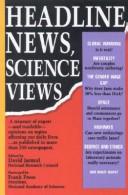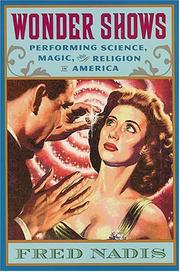| Listing 1 - 10 of 61 | << page >> |
Sort by
|
Book
ISBN: 9171394990 Year: 2000 Publisher: Stockholm Brutus Östlings bokförlag symposion
Abstract | Keywords | Export | Availability | Bookmark
 Loading...
Loading...Choose an application
- Reference Manager
- EndNote
- RefWorks (Direct export to RefWorks)
Science news --- -News, Science --- Popularization of science --- Science --- Communication in science --- Journalism --- Technical writing --- Popularization --- -Science news --- News, Science
Book
ISBN: 2759822478 Year: 2018 Publisher: Les Ulis Cedex A, France : EDP Sciences,
Abstract | Keywords | Export | Availability | Bookmark
 Loading...
Loading...Choose an application
- Reference Manager
- EndNote
- RefWorks (Direct export to RefWorks)
De Fontenelle à Gaston Tissandier, la Vulgarisation trace son chemin, à travers les remous de l’Histoire, avec les abbés Nollet, Pluche et Moigno – soucieux de concilier religion et science – et les républicains Arago, Figuier, Flammarion, Meunier, Jules Verne et tant d’autres. Elle permet à un public de plus en plus varié, grâce aux progrès de la presse et de l’imprimerie, de suivre de près les découvertes scientifiques, mais aussi de comprendre les progrès techniques qui modifient la vie "idienne : le chemin de fer, l’électricité, les ascenseurs, la bicyclette et l’automobile, etc. Ce public peut même assister aux démonstrations, lors des grandes Expositions universelles qui éclairent le siècle. Des collections spécialisées voient le jour, Manuels Roret, Bibliothèque des Merveilles. Les premières revues périodiques de vulgarisation se multiplient. Cosmos et La Nature préfigurent les revues modernes. De grandes revues généralistes, la Revue des Deux Mondes, Le Magasin pittoresque, l’Illustration n’hésitent pas à publier des articles de vulgarisation.
Science --- Science news. --- News, Science --- Popularization of science --- Communication in science --- Journalism --- Technical writing --- History. --- Popularization
Periodical
ISSN: 13616609 09636625 Year: 1992 Publisher: [Bristol] : London : Institute of Physics, jointly with the Science Museum, London SAGE
Abstract | Keywords | Export | Availability | Bookmark
 Loading...
Loading...Choose an application
- Reference Manager
- EndNote
- RefWorks (Direct export to RefWorks)
Science news --- Science news. --- News, Science --- Popularization of science --- Science --- Popularization --- Communication in science --- Journalism --- Technical writing --- Related to --- Society
Book
ISBN: 0226467791 9780226467795 Year: 1990 Publisher: Chicago London University of Chicago Press
Abstract | Keywords | Export | Availability | Bookmark
 Loading...
Loading...Choose an application
- Reference Manager
- EndNote
- RefWorks (Direct export to RefWorks)
Science news --- United States --- History --- Science news - United States - History. --- News, Science --- Popularization of science --- Science --- Communication in science --- Journalism --- Technical writing --- Popularization
Book
ISBN: 2850080667 9782850080661 Year: 1985 Publisher: Lyon: Chronique sociale,
Abstract | Keywords | Export | Availability | Bookmark
 Loading...
Loading...Choose an application
- Reference Manager
- EndNote
- RefWorks (Direct export to RefWorks)
Science news --- Communication in science --- News, Science --- Popularization of science --- Science --- Journalism --- Technical writing --- Communication in research --- Science communication --- Science information --- Scientific communications --- Popularization --- SCIENCES --- VULGARISATION --- CONGRES

ISBN: 0309043840 0309044804 9786610211906 1280211903 0309582970 0585155321 9780585155326 9780309044806 9781280211904 6610211906 9780309582971 9780309043847 Year: 1991 Publisher: Washington, D.C. National Academy Press
Abstract | Keywords | Export | Availability | Bookmark
 Loading...
Loading...Choose an application
- Reference Manager
- EndNote
- RefWorks (Direct export to RefWorks)
Science news --- Science --- Technology --- Health --- Medical policy --- Physical Sciences & Mathematics --- Sciences - General --- Social aspects --- Public health --- News, Science --- Popularization of science --- Popularization --- Communication in science --- Journalism --- Technical writing
Book

ISBN: 2271121949 2271072417 Year: 2019 Publisher: Paris : CNRS Éditions,
Abstract | Keywords | Export | Availability | Bookmark
 Loading...
Loading...Choose an application
- Reference Manager
- EndNote
- RefWorks (Direct export to RefWorks)
Quels sont les rapports entres sciences et médias ? À l'heure où l'on s'interroge sur l'impact de la recherche sur l'environnement et la santé, où l'on débat de la sortie ou non du nucléaire, la médiatisation des activités scientifiques prend une importance croissante. Pourquoi ce changement est-il révélateur ? Comment les téléspectateurs perçoivent-ils les émissions scientifiques ? Comment les journalistes choisissent-ils les chercheurs qui vont éclairer les débats publics ? Un livre percutant sur un sujet crucial.
Science in mass media. --- Science news. --- News, Science --- Popularization of science --- Science --- Communication in science --- Journalism --- Technical writing --- Mass media --- Popularization --- médias --- santé --- environnement --- communication --- télévision
Book
ISBN: 9782759811601 9782759816958 2759816958 2759811603 Year: 2014 Publisher: Les Ulis : ECP sciences,
Abstract | Keywords | Export | Availability | Bookmark
 Loading...
Loading...Choose an application
- Reference Manager
- EndNote
- RefWorks (Direct export to RefWorks)
Vulgarisation, mode d’emploi est le premier guide de vulgarisation. Il offre des réponses concrètes aux scientifiques et ingénieurs souhaitant partager leurs savoirs avec le plus grand nombre. Véritable manuel pratique, il décrit les règles de base, les pièges à éviter, les différents modes de vulgarisation et de médiation scientifiques, sans oublier les aspects concrets des petits et grands projets de médiation scientifique. Aujourd’hui, s’exprimer clairement sur les sciences est indispensable pour développer ses collaborations, décrocher des financements, intéresser les médias, et attirer des étudiants. Mais aussi pour se rapprocher des citoyens, souvent déboussolés face aux sciences et à leurs applications. Au-delà des scientifiques, ce livre s’adresse à tous les experts d’un domaine – médecins, économistes, hommes de loi, techniciens, qui ont besoin de communiquer avec des non-spécialistes. Qui est mon public ? Quelles sont ses attentes ? Est-ce possible de simplifier sans déformer ? Quelles astuces pour accrocher l’intérêt de mon auditoire ? Où se former à la vulgarisation ? Comment interagir avec des journalistes ? Ai-je le droit de parler dans les médias sans l’autorisation de ma hiérarchie ? Comment utiliser au mieux les possibilités d’Internet ? Autant de questions que se pose l’apprenti-vulgarisateur, qui trouvera dans ce livre des réponses et des conseils directement applicables. Mais surtout, il y dénichera des idées pour inventer sa propre manière de vulgariser. Basé sur une expérience de plus de 10 ans de formations à la vulgarisation, alliée à une connaissance approfondie du monde scientifique et des médias, cet ouvrage s’appuie sur des exemples vécus, des témoignages de chercheurs et de journalistes. Des vulgarisateurs parmi les plus connus livrent leur vision de cet art complexe et captivant qu’est la médiation scientifique.
Science. --- Natural science --- Natural sciences --- Science of science --- Sciences --- Science news --- News, Science --- Popularization of science --- Science --- Communication in science --- Journalism --- Technical writing --- Popularization

ISBN: 0813541212 9780813541211 081353898X 9780813538983 0813535158 9780813535159 Year: 2005 Publisher: New Brunswick, N.J. Rutgers University Press
Abstract | Keywords | Export | Availability | Bookmark
 Loading...
Loading...Choose an application
- Reference Manager
- EndNote
- RefWorks (Direct export to RefWorks)
Imagine a stage full of black cats emitting electrical sparks, a man catching bullets with his teeth, or an evangelist jumping on a transformer to shoot bolts of lightning through his fingertips. These and other wild schemes were part of the repertoire of showmen who traveled from city to city, making presentations that blended science with myth and magic. In Wonder Shows, Fred Nadis offers a colorful history of these traveling magicians, inventors, popular science lecturers, and other presenters of “miracle science” who revealed science and technology to the public in awe-inspiring fashion. The book provides an innovative synthesis of the history of performance with a wider study of culture, science, and religion from the antebellum period to the present. It features a lively cast of characters, including electrical “wizards” Nikola Tesla and Thomas Alva Edison, vaudeville performers such as Harry Houdini, mind readers, UFO cultists, and practitioners of New Age science. All of these performers developed strategies for invoking cultural authority to back their visions of science and progress. The pseudo-science in their wonder shows helped promote a romantic worldview that called into question the absolute authority of scientific materialism while reaffirming the importance of human spirituality. Nadis argues that the sensation that these entertainers provided became an antidote to the alienation and dehumanization that accompanied the rise of modern America. Although most recent defenders of science are prone to reject wonder, considering it an ally of ignorance and superstition, Wonder Shows demonstrates that the public’s passion for magic and meaning is still very much alive. Today, sales continue to be made and allegiances won based on illusions that products are unique, singular, and at best, miraculous. Nadis establishes that contemporary showmen, corporate publicists, advertisers, and popular science lecturers are not that unlike the magicians and mesmerists of years ago.
Science news --- Magic shows --- Revivals --- Protracted meetings (Revivals) --- Revival (Religion) --- Evangelistic work --- Amusements --- News, Science --- Popularization of science --- Science --- Communication in science --- Journalism --- Technical writing --- History --- Popularization
Book
ISBN: 9004365974 9004365966 Year: 2018 Publisher: [S.l.] : BRILL,
Abstract | Keywords | Export | Availability | Bookmark
 Loading...
Loading...Choose an application
- Reference Manager
- EndNote
- RefWorks (Direct export to RefWorks)
In Presented Discourse in Popular Science , Olga A. Pilkington explores the forms and functions of the voices of scientists in books written for non-professionals. This study confirms the importance of considering presentation of discourse outside of literary fiction: popular science uses presented discourse in ways uncommon for fiction yet not conventional for non-fiction either. This analysis is an acknowledgement of the social consequences of popularization. Discourse presentation of scientists reconstructs the world of the scientific community as a human space but also projects back into it an image of the scientist the public wants to see. At the same time, Pilkington’s findings strengthen the view of popularization that rejects the notion of a strict divide between professional and popular science.
Science news. --- Scientists. --- Science. --- Natural science --- Natural sciences --- Science of science --- Sciences --- Professional employees --- News, Science --- Popularization of science --- Science --- Communication in science --- Journalism --- Technical writing --- Popularization
| Listing 1 - 10 of 61 | << page >> |
Sort by
|

 Search
Search Feedback
Feedback About
About Help
Help News
News